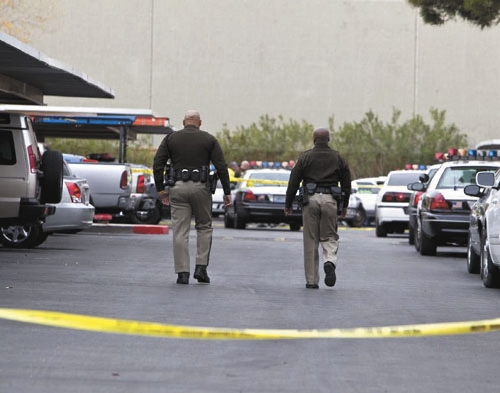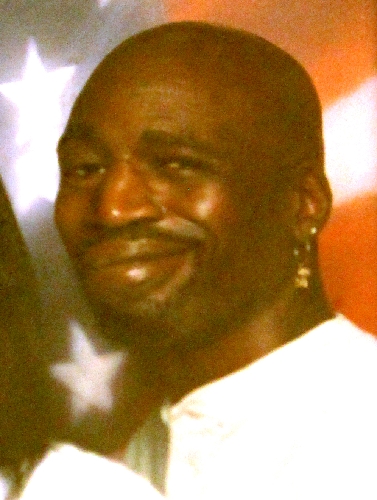Grand jury decides not to indict officer in death of veteran
A Clark County grand jury decided not to indict Las Vegas police officer Jesus Arevalo in the 2011 controversial fatal shooting of disabled veteran Stanley Gibson.
An investigation by the grand jury into the shooting began in October and included testimony from about a dozen witnesses.
District Attorney Steve Wolfson said Wednesday he was bound by state law not to comment on grand jury matters.
The grand jury's decision was met with mixed emotions by those closest to the case.
Gibson's wife, Rondha Gibson, was too distraught to speak after hearing the news. "She's very, very upset," said Steve Sanson, President of Veterans in Politics, who answered the widow's cellphone Wednesday afternoon.
Stanley Gibson's brother, Rudy Gibson, wrote in an email that he was in tears and wished the decision would have come after the holidays. This was just another example of the lack of accountability for Las Vegas police officers, he said.
"It's OK to continue to execute people in this town as long as you wear a badge. It's OK to repeatedly break the rules, if you wear a badge. It's OK to break laws, if you wear a badge. It's OK to destroy families and lives," Rudy Gibson said.
In an email obtained by the Las Vegas Review-Journal, the Las Vegas Police Protective Association announced to its nearly 3,000 members Wednesday that the grand jury "decided to take no action after hearing evidence concerning the Stanley Gibson incident.
"Officer Jesus Arevalo wants to express his gratitude to his fellow officers and supervisors who supported him during this very stressful year," according to the email sent by David Roger, the former district attorney and now police union lawyer. "While we all recognize that Stanley Gibson's death was tragic and unfortunate, we are grateful the Grand Jury did not return an indictment."
Police union executive director Chris Collins said his organization has steadfastly held that Gibson's death was a tragedy but not the result of criminal actions.
"We're very happy for officer Arevalo and everyone involved," Collins said. "It's a great burden of relief for them around the holiday season."
The grand jury could still issue a report clearing the officer or do nothing.
State law prohibits making transcripts of a grand jury proceeding public unless an indictment is returned, a call for criminal charges is made or the target of the grand jury agrees to have them made public.
Even if the grand jury does nothing, state law would allow the county district attorney to issue a decision on whether the shooting was justified. Wolfson has issued 20 decisions on officer-involved fatalities since taking office almost a year ago. Those decisions are accompanied by detailed reports on the evidence in those cases and available to the public on the district attorney's website. Wolfson has ruled officers acted lawfully in the 20 incidents.
Attorney Cal Potter, who accused the Police Department of wrongful death in a federal lawsuit filed earlier this month on behalf of Rondha Gibson, said he was not surprised by the grand jury's decision.
Potter said the decision to go to the grand jury was a public relations move by Wolfson that alleviated him of the burden of deciding whether the fatal shooting was criminal.
"It has become a political decision and not a legal decision," Potter said. "The community should be up in arms about the entire proceeding."
Potter said this doesn't end the debate over Gibson's case.
"This is just the first round in what we believe will be a long fight in trying to obtain justice for (Rondha Gibson) and her family," the lawyer said.
Rondha Gibson filed the lawsuit against the Police Department on Dec. 12, the one-year anniversary of Gibson's death. Named in the lawsuit were Arevalo, Sgt. Michael Hnatuick, Lt. David Dockendorf and officer Malik Grego-Smith, who were on the scene of the shooting.
Sheriff Doug Gillespie was also named as a defendant.
Gillespie declined to comment for this story, according to a police spokesman.
Gibson's mother filed a separate lawsuit earlier this year.
Gibson, a 43-year-old disabled Gulf War veteran, apparently was lost and distraught in the parking lot of a northwest valley apartment complex early on Dec. 12, 2011.
His car was boxed in by two police cars, but he wouldn't follow officers' orders to get out.
Police hatched a plan to remove him from the car: One officer would shoot out a window with a beanbag shotgun, and another would douse the interior with pepper spray.
But, when the shotgun was fired, Arevalo fired an AR-15 rifle seven times into the vehicle, killing Gibson, who was unarmed.
Nevada, like many states, gives police broad discretion when using firearms. Officers can legally shoot someone if they can show a reasonable belief the subject poses grave danger to the officer or another person.
The law can excuse officers who shoot unarmed people, for example, if a reasonable person in the same situation would have done the same.
Until this year, prosecutors presented officer-involved, on-duty shootings to coroner's inquests. Only once has a coroner's jury decided a shooting was criminal. But when prosecutors in the 1976 case took that decision to a grand jury, it refused to indict the two Las Vegas officers.
Las Vegas Review-Journal writer Mike Blasky contributed to this report.
Contact reporter Francis McCabe at
fmccabe@reviewjournal.com or
702-380-1039 or reporter Antonio Planas
at aplanas@reviewjournal.com or
702-383-4638.
Deadly Force: When Las Vegas Police Shoot, and Kill
Las Vegas Review-Journal investigative series


















